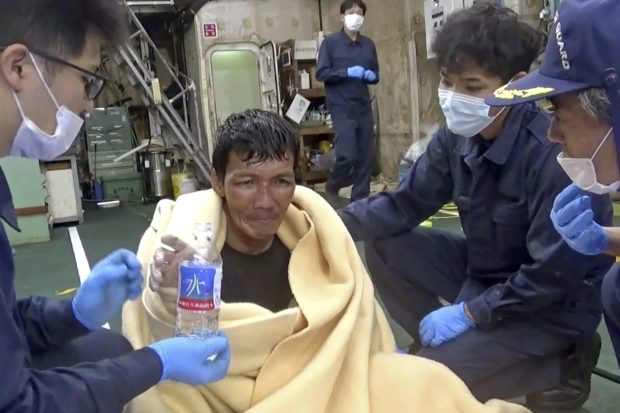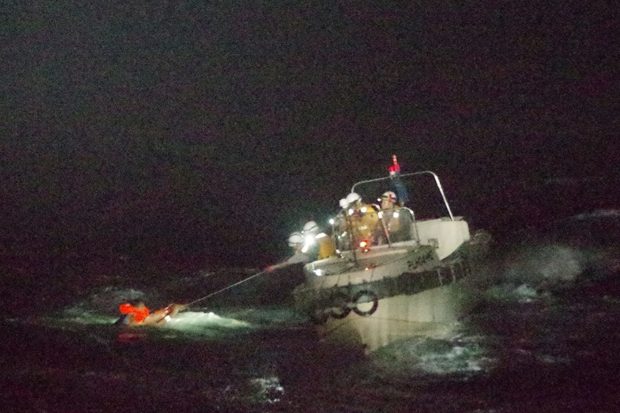MANILA, Philippines — The Japanese coast guard has temporarily suspended the search for more than 30 Filipino crew of the cargo ship that capsized in southwestern Japan on Wednesday as another typhoon barreled toward Japan’s Kagoshima prefecture, the Department of Foreign Affairs (DFA) said on Saturday.
Typhoon “Haishen,” locally known as Typhoon “10,” was expected to hit the vicinity of Amami Oshima island in Kagoshima on Saturday prompting the suspension of rescue operations, the DFA said, quoting reports from the Philipine Embassy in Tokyo and the Philippine consulate general in Osaka.
Japanese rescuers had already found three of the ship’s crew—including two Filipinos and another crewman of unannounced nationality. The crew consisted of 39 Filipinos, two New Zealanders and two Australians.
First to be rescued was the vessel’s 45-year-old Filipino chief officer Eduardo Sareno, who was found at sea by the coast guard and rescued late on Wednesday. The second was found alive but unconscious near Amami Oshima on Friday morning, but the sailor later died.
The third crew member to be rescued was 30-year-old deckhand Jay-Nel Rosales, who was found Friday afternoon by a search plane as he was waving for help on a life raft about two kilometers off Kodakara island.
Rescuers also found an overturned orange lifeboat floating at sea some 4 km off Kodakarajima, but no one was found on that boat.
The DFA said the two rescued Filipinos had already been in contact with their families.
Japanese maritime authorities said the missing seamen were on board the Panamanian-flagged Gulf Livestock 1 which was caught in rough seas and sent out distress calls early Wednesday as an earlier storm, Typhoon “Maysak” (Typhoon 9) hit southern Japan.
After his rescue, Sareno told authorities that the ship’s main engine failed before the vessel was struck by a big wave and capsized. He said the crew had put on their life jackets and they all jumped into the water.

SAFE Eduardo Sareno, chief officer of the capsized Gulf Livestock 1, is pulled in by elements of the 10th Regional Japan Coast Guard before being interviewed onboard the Japanese rescue ship.—AP
The vessel, which carried 5,867 live cows, sailed last Aug. 14 from Napier, New Zealand, and was heading to the Chinese port city of Tangshan. The cargo ship was owned by Gulf Navigation Holding based in Dubai, United Arab Emirates.
“Our hearts go out to those onboard and their families at this time. We also express deep regret for the sad loss of the livestock on board. We are monitoring the situation closely and working closely with those involved in rescue efforts. We pray that there are other survivors,” the company said on Thursday in a statement posted on its website.
The DFA said the consulate and the Philippine Overseas Labor Office continue to monitor the situation and coordinate with the Japanese Coast Guard, shipowner and the manning agency to extend all appropriate support for the Filipino seafarers and their families.
Several maritime reports logged over the past two years showed that the ship may have had some mechanical defects and revealed operational concerns.
A December inspection report from Indonesian authorities on the website of Equasis, which collates ship safety information from both public and private sources, logged issues with the ship’s propulsion and auxiliary machinery.
The issues included “deficiencies” with the propulsion main engine, gauges and thermometers.
A 2019 report by the Australian government on the cattle ship’s transit in June from Australia to Indonesia noted the vessel’s departure was delayed for a week because of “stability and navigation issues identified by the Australian Maritime Safety Authority.”
The Japanese coastguard said on Friday it had not set a deadline to end the search for survivors.
Four vessels, an airplane and several divers were scouring the waters on Friday when they discovered the second crew member, who has not been publicly identified.
—With a report from Reuters


